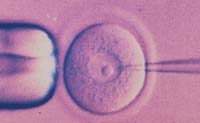Australian lawmakers clash in therapeutic cloning debate
Australia's prime minister and opposition leader told Parliament on Wednesday they will vote against a bill that would lift the country's ban on cloning human embryos for stem cell research.

"I've decided to vote against this legislation for the reason that in the end you have to take a stand for some absolutes in our society," Prime Minister John Howard told Parliament. "And I think what we're talking about here is a moral absolute and that is why I can't support the legislation."
Opposition Labor Party leader Kevin Rudd later said he had similarly wrestled with his conscience over the legislation and decided he could not support it.
Deputy Prime Minister Marke Vaile and Howard's deputy in the ruling Liberal party, Peter Costello, also said they would vote against the bill.
Supporting the legislation, Defense Minister Brendan Nelson said his generation had benefited enormously from the scientific endurance and judgment of those who pioneered difficult research and legislation.
"We owe it to the next generation no less to show the same wisdom and indeed the same courage," Nelson said.
The House of Representatives debate comes after the legislation narrowly passed through the Senate by a 34-32 vote on Nov. 7.
Scientists hope stem cell research will eventually lead to treatments for conditions including Parkinson's and Alzheimer's, as well as spinal cord injuries, diabetes and arthritis.
Parliament passed Australia's first laws on stem cell research in 2002, allowing scientists to extract stem cells from spare embryos intended for in vitro fertilization but preventing cell cloning.
The bill being debated now would allow for therapeutic cloning, the splicing of skin cells with eggs to produce stem cells, also known as master cells, which are capable of forming all the tissues of the human body.
Since the debate started Monday, lawmakers have been close to evenly split on whether the legislation should be passed.
Proponents hope the bill will be passed before Parliament adjourns for the year Thursday evening, reports AP.
However, if an amendment proposed in the House on Wednesday passes, the bill would have to go back to the Senate. That amendment would prevent the use of eggs from aborted female fetuses.
All parties are encouraging their lawmakers to vote according to their consciences rather than following party lines.
Subscribe to Pravda.Ru Telegram channel, Facebook, RSS!


